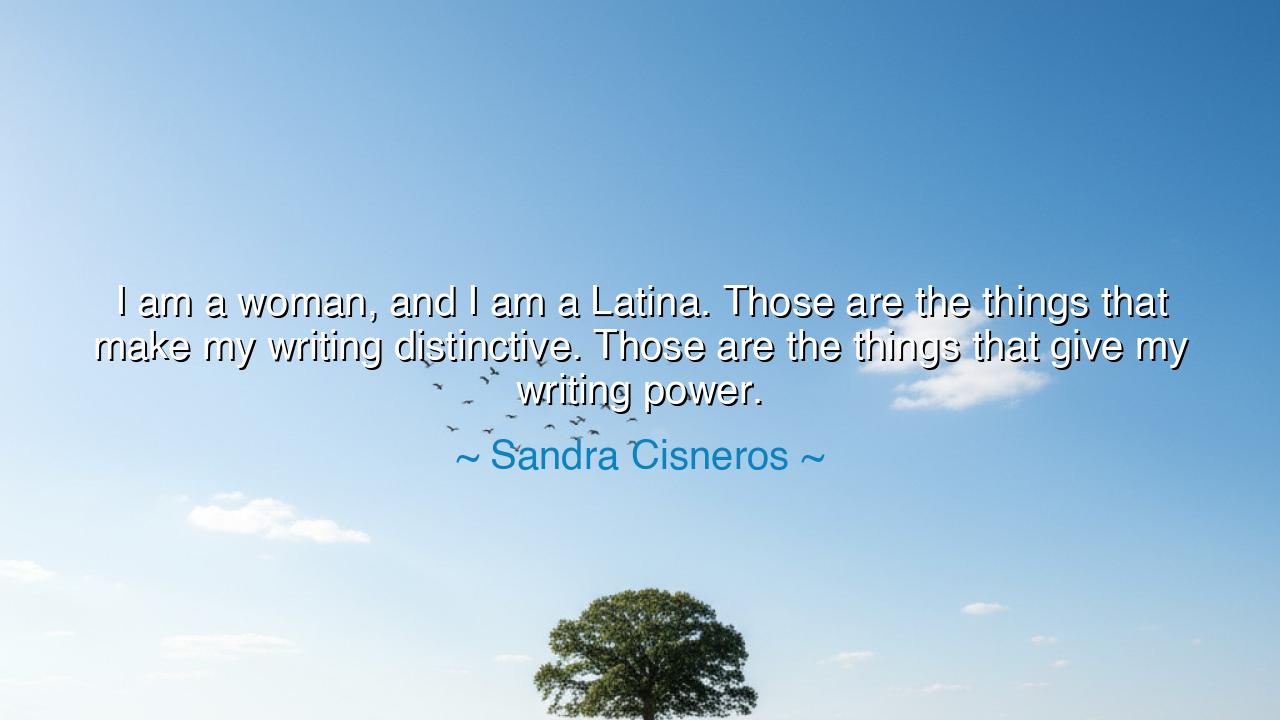
I am a woman, and I am a Latina. Those are the things that make
I am a woman, and I am a Latina. Those are the things that make my writing distinctive. Those are the things that give my writing power.






Hear me, O children of the future, for I bring to you the wisdom of Sandra Cisneros, who boldly declares: "I am a woman, and I am a Latina. Those are the things that make my writing distinctive. Those are the things that give my writing power." In these words, Cisneros speaks of the undeniable strength that comes from identity, from the very essence of one's being. It is in the embracing of the unique threads that make us who we are—the cultural heritage, the gender, the history—that we find the power to speak with authenticity, to create with purpose, and to shape the world with our voices.
Consider the ancient sages, who, though they hailed from different cultures and walks of life, understood that their power lay in their connection to the world around them. Confucius was a man of profound wisdom, rooted deeply in his Chinese heritage, yet it was his ability to speak to the universal truths of humanity that made his words eternal. Similarly, Socrates, born a humble Athenian, used his identity and the particular challenges of his time to fuel the philosophical revolution that would shape Western thought for centuries. Both knew that wisdom is not born in isolation, but in the melding of one's experiences, background, and culture into something universally resonant.
In more recent history, Maya Angelou, an iconic voice in literature, also drew from her identity as a Black woman to craft works that echoed with the strength of the oppressed and the wisdom of the resilient. Her writing was not simply an expression of her personal struggles, but a reflection of the collective experience of many who had suffered under the weight of racism and inequality. Like Cisneros, Angelou knew that the unique perspectives afforded by her identity gave her writing its power—its ability to move, to inspire, and to ignite change.
Just as Cisneros draws upon her Latina roots to give voice to the struggles and triumphs of her community, the power of writing often lies in the experiences of the writer. The female voice, often marginalized throughout history, carries with it the wisdom of endurance, resilience, and compassion. Women, throughout the ages, have wielded the pen not as a weapon of aggression, but as a tool of profound change—whether it was Virginia Woolf, who gave voice to the inner lives of women, or Toni Morrison, who painted the brutal and beautiful realities of Black life in America. Their distinctiveness—their identities—infused their writing with the strength that moved the hearts of nations.
So, O children, understand this well: identity is not something to be hidden or ashamed of, but something to be celebrated and used as the foundation for creating meaningful work. Your culture, your gender, and your personal experiences are the very things that give your words power. Do not try to erase them in an effort to fit into a mold—embrace them, for they are the source of your unique strength. Just as Cisneros uses her identity as a Latina and a woman to shape her writing, so too must you use your own to shape the world. It is in the full embrace of who you are that you will find the true power to leave your mark upon the world.






TVThang Tran Van
Cisneros’ assertion that her identity is key to her writing’s power is thought-provoking. It makes me think about how often writers from marginalized communities are expected to write only about their identities or experiences. Is this expectation empowering or limiting? Do writers, particularly those from diverse backgrounds, feel confined to certain themes? I’d be curious to know how she navigates the pressure to write ‘authentically’ versus exploring broader subjects outside her cultural identity.
NNNguyen Nhan
Sandra Cisneros’ perspective on the intersection of her identity and her writing makes me reflect on how much of ourselves we put into our creative work. It’s almost as though she’s saying that her writing is a direct reflection of who she is—both as a woman and as a Latina. This makes me wonder, though: can writers who don't share the same identity create equally impactful work, or is there an inherent value in writing that reflects one's lived experience?
MNmiop nam0123
The idea that identity—especially being a Latina woman—gives her writing power is something that resonates with me deeply. It suggests that art is not just about technique, but about the artist’s lived experience. But how much of this is true for all writers? Is it possible to truly harness the power of one's identity in writing if that identity is not widely understood or accepted? Can the power of underrepresented identities still shine through in such cases?
CCNguyen cao cuong
I think Sandra Cisneros’ emphasis on identity in her writing really speaks to the importance of owning who we are. For her, being a Latina and a woman are sources of strength. But I wonder, how does society’s view of identity influence the way writers or artists perceive their own power? Are there times when one’s identity becomes a limitation rather than a source of strength, particularly in more mainstream or commercial spaces?
MNTran Mai Ngo
Cisneros’ words about how being both a woman and a Latina give her writing power are really empowering. It’s a beautiful reminder of how our backgrounds and identities are not just aspects of who we are but powerful tools in expressing ourselves. But does this mean that all writers should embrace their cultural backgrounds in their work? Or is it equally valid for writers to explore identities that are outside of their own lived experience?